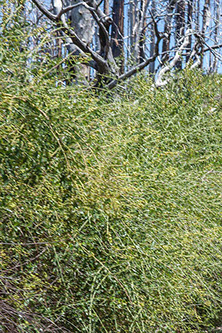Type Conversion


 Type conversion occurs when ecological disturbances reach a point that a system can no longer maintain itself but converts to another type of ecosystem, such as chaparral or grassland. Are the combined impacts of drought, beetles and fire, creating these conditions?
Type conversion occurs when ecological disturbances reach a point that a system can no longer maintain itself but converts to another type of ecosystem, such as chaparral or grassland. Are the combined impacts of drought, beetles and fire, creating these conditions?
There are many versions of this story: In San Diego much of the mountainous, forested area burned in the 2003 and 2007 fires. Areas where trees once stood are now covered by thick stands of chaparral, mostly ceanothus. Ceanothus grows quickly after fire. Will the trees grow back? Nobody knows. The hotter the weather, the more difficult it will be for trees to flourish.
In some sites the Forest Service is clearing the chaparral and replanting trees, concerned that the fires burned so hot that seeds were destroyed and that thick chaparral is impeding regrowth. Others argue that the ceanothus fixes nitrogen, a necessary first step in regeneration. Currently seedlings are surviving best on north and northeast facing slopes. The Forest Service's goal is not to restore the forest to the density and species composition that existed before the fire, but to a state that is "sustainable and manageable" under a changing climate. How can we be good stewards under changing conditions?
Cuyamaca State Park, the last photo shows where chaparral was cleared and trees planted at Middle Peak 2011
The Pacific Crest Trail passes through the Laguna Mountains. Continuing north a couple hundred miles hikers come to Walker Pass Campground. Imagine looking forward to a nice place to spend the night. Hikers last summer, 2016, found this parched scene. About sixty percent of the Pinon pines and juniper were dying. The drought of the last six years has transformed the forest from 4,500 to 6,000 in central and southern California for decades to come, if not permanently.
In recent years Pinon pines have died from drought and bark beetles in many parts of Arizona and New Mexico. Juniper are more drought hardy, but scientist Park Williams estimates that by 2050 Ponderosa pine (a close relative that interbreeds with the Jeffrey pine), Pinon pine and juniper will no longer grow in large areas of the southwest where they are found today, these places supporting grasslands or chaparral instead.
Walker Pass Campground and surroundings 2016







